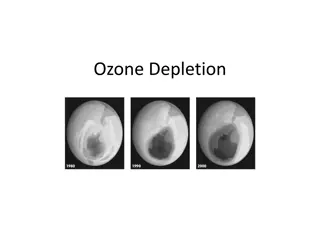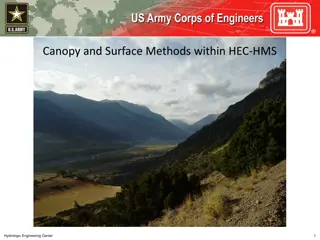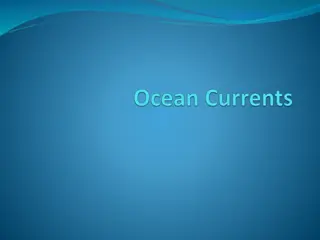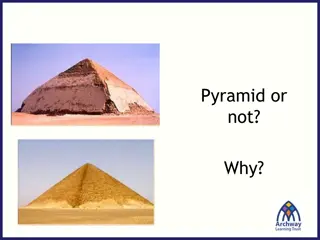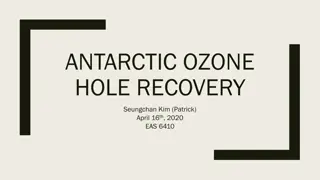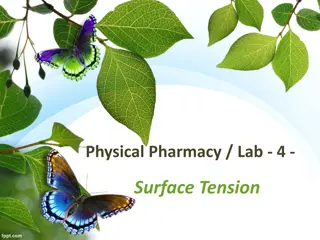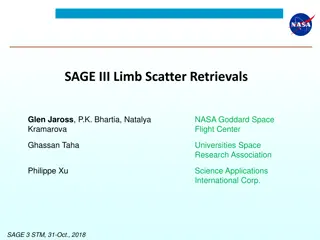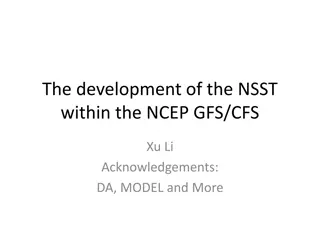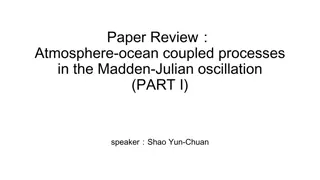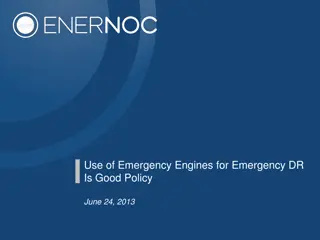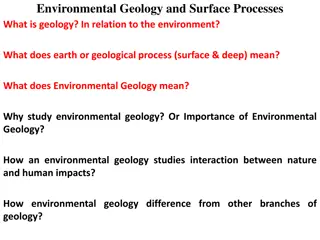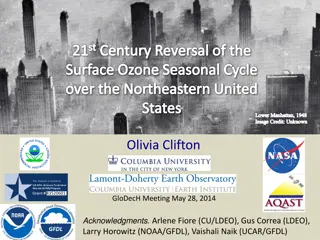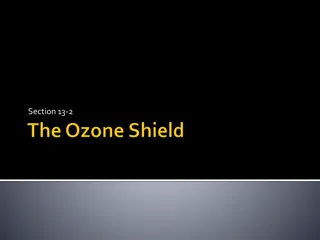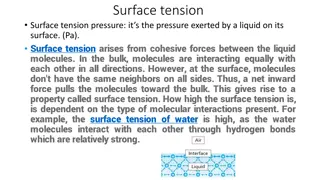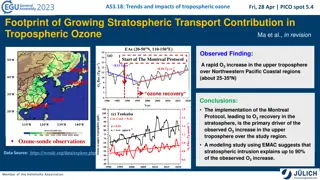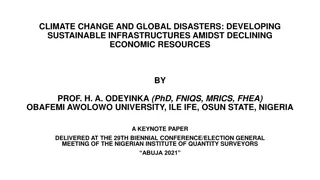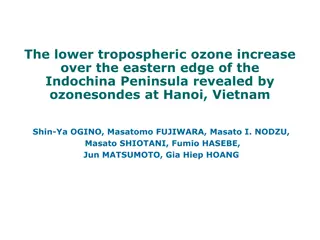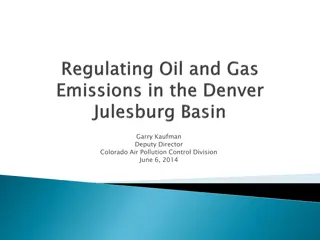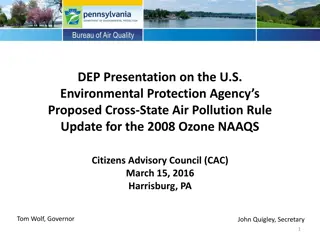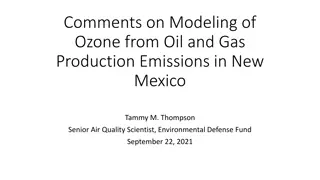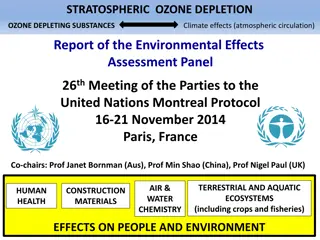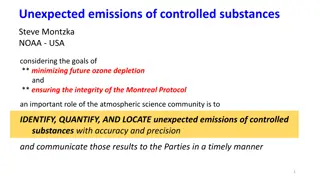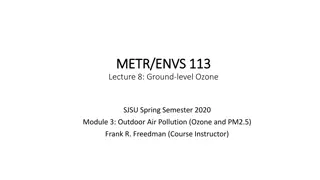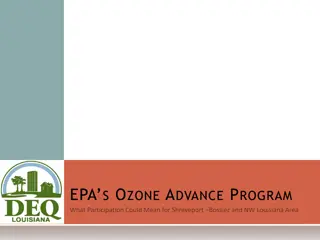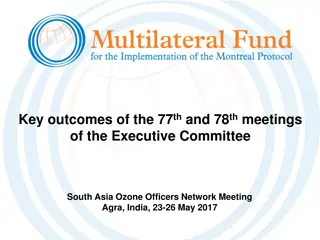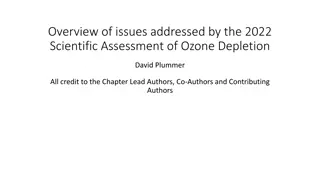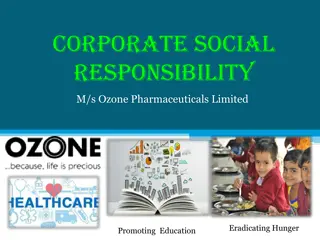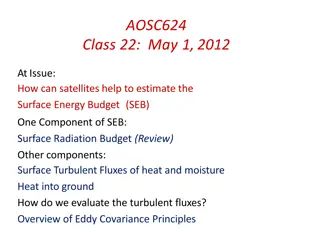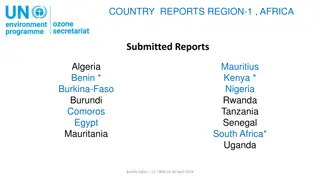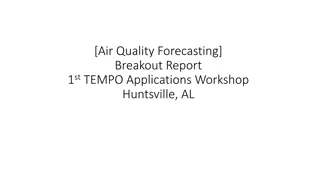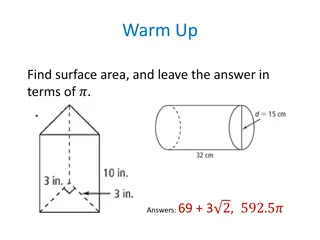Exploring Surface Tension and Wettability in Nature
Discover the fascinating world of surface tension and wettability through engaging experiments and observations, from water cohesion on a penny to the microscopic structures on lotus leaves. Delve into the role of cohesion and adhesion, surface wettability factors, and everyday applications of these
2 views • 17 slides
Understanding Surfaces and Interfacial Energy in Chemistry
Surfaces play a crucial role in free energy and dissolution processes, impacting surface tension and interfacial energy. Learn about the adsorption of molecules, surface excess properties, and the contributions of surface area and curvature to surface energy. Dive into concepts such as Laplace's equ
6 views • 71 slides
The Role of Sunlight, Ozone, and Plant Life in Earth's Atmosphere
Sunlight plays a crucial role in the formation of ozone from oxygen, leading to the protection of plant life against harmful UV radiation. The ozone produced by sunlight helps in the photosynthesis process of plants, which in turn release oxygen, absorb CO2, and contribute to the overall balance of
7 views • 23 slides
Best facility for Ozone Therapy in Soho
Hijama Cupping & Ozone Centre serves the Best facility for Ozone Therapy in Soho. They offers a wide range of services including: IV drip, skin whitening, ozone therapy, PRP plasma, hair loss treatment, cupping and much more. Experience the transformative power of ancient wisdom and modern innovatio
0 views • 6 slides
Understanding Ozone Depletion: Causes and Impact
The ozone layer, found in the stratosphere at 15 to 40 km altitude, plays a crucial role in absorbing harmful ultraviolet radiation. However, due to the use of Chlorofluorocarbons (CFCs), the ozone layer has been depleted, leading to the formation of the ozone hole. This depletion is caused by chemi
0 views • 27 slides
Understanding Canopy and Surface Methods in HEC-HMS
Explore the various canopy and surface methods utilized in HEC-HMS for managing water resources. Learn about canopy interception, evapotranspiration, common parameter values, and factors affecting losses. Delve into available methods, canopy storage values, and surface depression storage. Enhance yo
0 views • 12 slides
Tracer Study at City of Fairfield Public Works Waterman WTP - Ozone Contact Basin
Tracer study conducted at City of Fairfield Public Works Waterman Water Treatment Plant focused on the Ozone Contactor Basin, involving the injection of fluoride as a tracer, monitoring flow rates, and analyzing tracer concentrations over specific time intervals. The study aimed to assess the effici
0 views • 16 slides
Understanding Runoff in Surface Water Systems
Runoff, the flow of precipitation and other contributions in surface streams, plays a crucial role in watershed systems. It encompasses various sources such as surface runoff, interflow, and base flow. Surface runoff, which travels over the ground surface to channels, is influenced by factors like s
1 views • 27 slides
Understanding Ocean Currents and Effects
Ocean currents play a crucial role in the movement of water across the Earth's surface. Wind-driven surface currents, influenced by the Coriolis effect, move water horizontally and impact climate patterns worldwide. Major currents extend deep below the surface and can move rapidly, while rip current
0 views • 14 slides
Exploring Surface Area in Mathematics
Delve into the concept of surface area as an essential mathematical topic, understanding its significance in everyday life and its application in various 3D shapes. Learn how to calculate surface area for different space figures like prisms and pyramids through step-by-step methods. Engage with esse
6 views • 21 slides
Exploring Pyramid Geometry for Surface Area Calculations
Delve into the concept of surface area calculations for pyramids, ranging from identifying fake pyramids to determining the surface area of iconic structures like the Great Pyramid. Learn about the essential information needed, such as base length and slant height, to derive accurate measurements. D
0 views • 32 slides
Antarctic Ozone Hole Recovery and Future Challenges
Depletion of the stratospheric ozone layer in Antarctica due to chlorine emissions led to the formation of the ozone hole. Since the phasing out of Ozone-Depleting Substances (ODSs) under the Montreal Protocol, there has been a reduction in anthropogenic ODSs in the troposphere. Observations and che
0 views • 12 slides
Understanding Surface Tension in Physical Pharmacy Lab
Surface tension is a crucial concept in physical pharmacy lab dealing with gas-solid or gas-liquid interfaces. It refers to the force per unit length required to balance the inward pull on the surface. Interfacial tension, cohesive forces, and adhesive forces play significant roles in determining su
0 views • 16 slides
Advanced Analysis of SAGE III Limb Scatter Retrievals
The proposed effort focuses on enhancing LaRC operational retrieval codes for SAGE LS data, correcting Level 1 radiances, and recommending LS operational scenarios. OMPS LS retrieval algorithms for aerosol and ozone, as well as the SAGE/M3 LS ozone retrieval approach, are detailed. Out-of-field stra
0 views • 12 slides
Understanding Near-Surface Sea Temperature Development in NCEP GFS/CFS
This informative piece delves into the evolution of Near-Surface Sea Temperature (NSST) within the NCEP GFS/CFS, discussing its significance in Numerical Weather Prediction (NWP) systems, the utilization of sea surface temperature (SST), and the T-profile near the sea surface. It covers the role of
0 views • 28 slides
Understanding Atmosphere-Ocean Coupling in Madden-Julian Oscillation
Atmosphere-ocean coupled processes in the Madden-Julian Oscillation (MJO) play a crucial role in intraseasonal oscillations. This paper review by Shao Yun-Chuan explores how the ocean's Sea Surface Temperature (SST) influences surface fluxes, MJO convection, and energy balance dynamics. It delves in
0 views • 17 slides
Analysis of Emergency Engines and Ozone Levels in Demand Response Events
Use of emergency engines in demand response (DR) events does not correlate with high ozone levels, as shown by a study conducted from 2005 to 2011 across various regions like PJM, ISO NE, NYISO, and ERCOT. The analysis reveals that emergency DR events do not align with high ozone days, indicating no
0 views • 12 slides
Understanding Environmental Geology and Surface Processes
Geology in relation to the environment involves studying Earth's geological processes, both surface and deep, and their impacts on nature and human activities. Environmental geology focuses on the interaction between humans and the Earth's near-surface environment, addressing hazards like erosion, f
0 views • 71 slides
Addressing Misconceptions in Writing Across the Curriculum (WAC) Classes
WAC approaches in geology classes aim to correct persistent misconceptions through gateway activities, focusing on topics like CFCs and ozone depletion. By engaging students in discussions and written responses, educators correct prior misunderstandings to enhance learning outcomes and clarify disti
0 views • 6 slides
Surface Ozone Seasonal Cycle Reversal Study in Northeastern United States Lower Manhattan
Study on the reversal of the surface ozone seasonal cycle over Northeastern United States Lower Manhattan, analyzing the impact of NOx and VOC emissions on Surface O3 levels. Research shows a 26% decrease in regional NOx emissions leading to changes in the seasonal cycle of surface ozone concentrati
0 views • 24 slides
Understanding Ozone Depletion and Its Impact on the Environment
The stratosphere contains a vital layer of ozone that shields the Earth from harmful UV radiation. However, human activities, particularly the use of chlorofluorocarbons (CFCs), have led to the depletion of this protective ozone layer, especially over the poles. This thinning of ozone poses signific
0 views • 10 slides
Understanding Surface Tension in Physical Pharmacy Lab
Surface tension is a critical aspect in physical pharmacy lab experiments, involving the study of forces at gas-solid or gas-liquid interfaces. It is the force per unit length required to counterbalance the net inward pull on a surface. The concept extends to interfacial tension, cohesive and adhesi
0 views • 21 slides
Understanding Surface Tension: Properties, Measurement Methods, and Calculations
Surface tension is the pressure exerted by a liquid on its surface due to cohesive forces among molecules. The measurement methods include the liquid rise in a capillary tube technique, drop weight method, and bubble pressure method. The surface tension coefficient can be calculated using the equati
0 views • 12 slides
Impacts of Tropospheric Ozone and Stratospheric Transport Contribution
The study examines the trends and impacts of tropospheric ozone, focusing on the significant increase observed over the Northwestern Pacific Coastal regions. It explores the primary drivers behind this ozone increase, attributing up to 90% to stratospheric intrusions as a result of the Montreal Prot
0 views • 6 slides
Developing Sustainable Infrastructures Amid Climate Change and Global Disasters
Prof. H.A. Odeyinka's keynote paper discusses the importance of developing sustainable infrastructures amidst declining economic resources in the face of climate change and global disasters. It highlights the concepts of climate change, sustainable development, atmospheric layers, ozone layer, carbo
0 views • 25 slides
Study on Lower Tropospheric Ozone Increase in Indochina Peninsula
Research conducted in Hanoi, Vietnam, reveals an increase in lower tropospheric ozone over the eastern edge of the Indochina Peninsula. The study focuses on understanding the three-dimensional distribution and temporal variation of ozone to comprehend air pollution and atmospheric variability. Findi
0 views • 11 slides
Strategies for Oil and Gas Emission Reduction in Colorado
Garry Kaufman, Deputy Director of the Colorado Air Pollution Control Division, outlines efforts to reduce air pollution from oil and gas emissions, focusing on past initiatives, ozone standards, and methane reduction strategies. The historical context sheds light on the evolution of regulations and
0 views • 25 slides
U.S. EPA's Proposed Cross-State Air Pollution Rule Update for 2008 Ozone NAAQS
The U.S. Environmental Protection Agency (EPA) issued the Cross-State Air Pollution Rule (CSAPR) in 2011, aiming to improve air quality by reducing power plant emissions across state lines. Challenges and subsequent revisions led to the proposed CSAPR Update Rule in 2015, targeting interstate air po
0 views • 27 slides
Modeling the Impact of Oil and Gas Emissions on Ozone in New Mexico
Tammy M. Thompson, a Senior Air Quality Scientist at the Environmental Defense Fund, discusses the modeling of ozone from oil and gas production emissions in New Mexico. The analysis focuses on areas with high ozone concentrations and their overlap with oil and gas regions, highlighting the sensitiv
0 views • 8 slides
Impacts of Stratospheric Ozone Depletion on Ecosystems and Human Health: 2014 Assessment Report
Significant scientific advances in understanding the effects of stratospheric ozone depletion on ecosystems and human health were presented in the 2014 Assessment Report. The report assessed research covering various subject areas and highlighted the increased UV-B radiation levels due to ozone depl
0 views • 20 slides
Monitoring Unexpected Emissions of Controlled Substances for Ozone Protection
The atmospheric science community plays a crucial role in identifying, quantifying, and communicating unexpected emissions of controlled substances to support the goals of minimizing future ozone depletion and upholding the Montreal Protocol. By comparing observation-based estimates of global emissi
0 views • 13 slides
Understanding Ground-Level Ozone Pollution: Health Effects and Historical Perspective
Ground-level ozone, a secondary pollutant formed by NOx and VOCs, poses significant health risks such as lung inflammation and respiratory illnesses. This article delves into the adverse effects of ozone inhalation, regulatory efforts, and a historical perspective, including the alarming levels reco
0 views • 24 slides
Understanding the EPA's Ozone Advance Program and Clean Air Act
The content covers key information about the EPA's Ozone Advance Program, including the basics of ozone, the Clean Air Act requirements, designation vs. classification, classification deadlines, and marginal classification requirements. It explains the formation of ozone, the importance of reducing
0 views • 40 slides
Key Outcomes of 77th and 78th Meetings of South Asia Ozone Officers Network
The Executive Committee South Asia Ozone Officers Network meetings held in Agra, India, discussed key issues and decisions taken in 2017. The presentation outlined ExCom meetings and membership in 2016 and 2017, highlighting considerations and decisions made at the 77th and 78th meetings. The outcom
0 views • 27 slides
Insights from 2022 Scientific Assessment of Ozone Depletion
The 2022 Scientific Assessment of Ozone Depletion, led by David Plummer, addresses key issues like Ozone Depleting Substances, HFCs, Global and Polar Stratospheric Ozone, Climate Impacts, Stratospheric Aerosol Injection, and more. Chapter details reveal decreasing trends in Ozone Depleting Substance
0 views • 12 slides
Ozone Pharmaceuticals Limited Corporate Social Responsibility Activities
Ozone Pharmaceuticals Limited has crossed the CSR threshold limit and is executing CSR funds for eradicating hunger and promoting education. The company's CSR committee has approved funds for activities aimed at societal betterment through Maa Madhuri Brij Varis Sewa Sadan Apna Ghar Sanstha. The imp
0 views • 9 slides
Satellite Applications in Estimating Earth's Surface Energy Budget
Satellites play a crucial role in estimating the Surface Energy Budget (SEB) by providing data on various components such as Surface Radiation Budget and Surface Turbulent Fluxes. The SEB includes factors like net radiation flux, sensible and latent heat fluxes, and subsurface heat transfer. Satelli
0 views • 38 slides
Ozone Observational and Monitoring Activities in Algeria and Burkina Faso
Algeria's National Meteorology Office conducts ozone monitoring at GAW stations in Tamanrasset City and Assekrem. Calibration and data reporting are done regularly to WOUDC. In Burkina Faso, NAMA-BF oversees meteorological observations and is acquiring instruments for ozone monitoring. Collaboration
0 views • 20 slides
Insights into Air Quality Forecasting Breakout Report from TEMPO Applications Workshop
The breakout report from the TEMPO Applications Workshop in Huntsville, AL highlights the potential of TEMPO data in improving air quality forecasting. It discusses the measurement of ozone precursors, ozone, and PM2.5 on an hourly scale, emphasizing the value of high spatial and temporal resolution
0 views • 8 slides
Geometry Concepts for Surface Area Calculations
Explore various geometric shapes such as pyramids and cones to calculate surface area. Learn the differences between prisms and pyramids, understand the importance of altitude and slant height in pyramids, and differentiate between lateral and surface areas. Practice finding lateral and surface area
0 views • 16 slides




